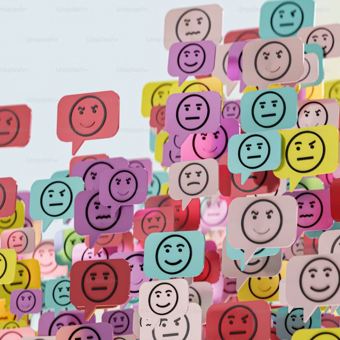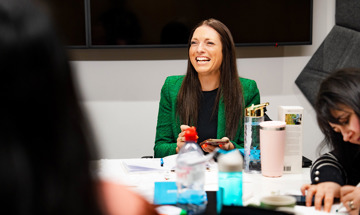One in five people are neurodivergent. However, studies show that neuroinclusion still isn’t a priority in many workplaces.
Within Centrica, our Neurodiversity network provides a community of support for colleagues across the business.
We caught up with Emma and Chyna, the network’s Co-Chairs, to hear how their personal experiences inspired them to establish the network and help build a neuroinclusive workplace.
What is neurodiversity?
Many people don’t know what neurodiversity is - but it’s simple to understand.
Neurodiversity refers to how people experience and interact with the world around them in different ways, meaning there is no “right” way of doing and thinking about things. Differences are not seen as deficits. While this includes everyone, it mainly refers to people with conditions like ADHD, dyslexia, autism and dyspraxia.
So how can a workplace embrace neurodiversity?
Understanding, embracing and celebrating people’s differences.
Building a neuroinclusive environment is crucial – not just for the wellbeing of colleagues, but because neurodiversity brings unique skills to any workplace, from problem-solving to hyperfocus.
“I was told that this was a disability I’d have to navigate, but neurodiverse people have so many strengths”, says Emma. Chyna agrees, explaining how she’s “super empathetic”, which has led her to be “extra protective over her team”.

Meet Emma and Chyna
Emma and Chyna have completely different stories – both personally and professionally – but they both share a passion for uplifting and celebrating other neurodivergent colleagues.
Let’s learn more about their journeys:
“When I was young, I had a virus called encephalitis – inflammation of the brain. I spent a long time unwell in hospital, and it left me with a lot of neurological challenges. I was told I was significantly disabled and would need to adapt my life accordingly.”
Emma has worked at British Gas and Centrica for over 17 years, and for her, joining the business’s neurodiversity chat changed her life. “It was the first time I’d heard the term – and that’s when I started my journey from disablement to a strength-based enablement”. From then on, Emma became passionate about promoting a neuroinclusive workplace.
“At school, I remember going to a teacher with something that I’d worked so hard on, and she congratulated me, saying I hadn’t got any letters backwards. Shortly after, I was taken into the headmaster’s office, had an assessment and was diagnosed with dyslexia.”
Having worked at British Gas for 18+ years, Chyna teamed up with Emma as the first Co-Chairs of the neurodiversity network, with the aim of “raising awareness of neurodiversity and what we bring to teams across the business.”
Why support matters
“Being neurodivergent can be isolating, so knowing you’re supported, and having a community who can lift you up, is invaluable.”
Emma and Chyna clearly aren’t alone in their thinking. The Neurodiversity network is quickly growing, gaining hundreds of members in a matter of months – and as the community grows, the support available grows with it.
Here's 3 ways we’re supporting our neurodivergent colleagues:
1. Making recruitment more inclusive:
-
Providing recruitment coaching to help tackle unconscious bias and make the application process as inclusive as possible.
2. Sharing stories:
-
Hosting company-wide discussions to open up the conversation, encouraging guest speakers to share their experiences.
3. Educating the wider team:
-
Working with managers on how to best communicate with neurodivergent colleagues.
-
Rolling out training modules to ensure teams across the business have the tools they need to learn more.
Getting everyone involved
But education and support doesn’t stop there.
“I live and breathe neurodiversity”, explains Chyna, “but we tend to find that there are people who don’t know much about it, and that’s a really good reason for colleagues to get involved with the Centrica training modules.”
This new course, available to everyone at Centrica and British Gas, is designed to help managers and teams gain a deeper understanding of neurodiversity, and learn how they can better support their colleagues, as well as the wider neurodivergent community.
“It opens people’s minds to what neurodiversity is, and raises awareness at the same time”, says Emma, “which is why we’re encouraging everyone - managers, colleagues and our teams - to take part”.
We hope that by educating our colleagues, this inclusive support and awareness can be carried further into local communities, helping everyone to embrace the power of being themselves.

Case Study
Centrica's Market Leading Commitment to Trans Inclusion
Our people

Case Study
Chris O'Shea: The Employment Rights Bill will be good for business.
Our people

Case Study
In conversation with... Victoria Belkhyate
Our people

Case Study
Meet the Fathers of Centrica
Our people

Case Study
Black History Month: Reclaiming Narratives
Our people

Case Study
The Working Parents of Centrica
Our people


